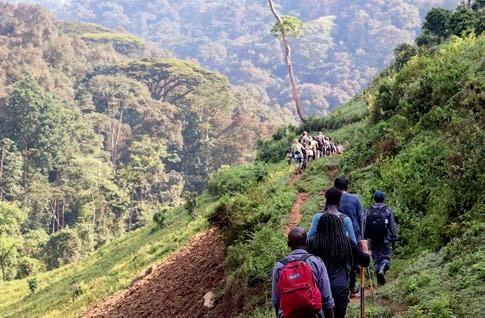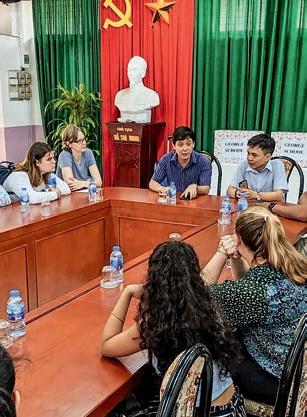
7 minute read
Education Without Borders
NORTH AMERICA
Arizona: Navajo Culture & Spirituality
EUROPE
Greece: Storytelling for Social Justice Rome: Vergil’s Aeneid Netherlands: Economics & Sustainability
SOUTH AMERICA
Peru: Peruvian Past & Culture
AFRICA
South Africa: Art, Ecology & Social Justice Uganda: Wildlife Conservation & Ecology East Africa: Contemporary East African Society & Conservation
George School students have the opportunity to take courses that include a travel component to places like Italy, Greece, the Navajo Nation, the Netherlands, Peru, South Africa, Uganda, or Vietnam as part of a curriculum to help students develop an in-depth understanding of our world and its complexities.
ASIA
Vietnam: A Brief History of Vietnam

Wildlife Conservation & Ecology in Uganda helps students learn about, design, and conduct high-quality field research in Uganda’s varied biomes to produce meaningful scientific data.
Global engagement and interdisciplinary learning have long been cornerstones of a George School education. Since the first service and exchange trips in 1949, the school has led the way internationally, expanding students’ understanding of our complex, interdependent world or, as Head of School Sam Houser puts it, “how to build communities across cultures and across nations, to be cosmopolitan in that real, ancient Greek sense— to be citizens of the world.” With the arrival of the Signature Academic Program and its flexible calendar, George School once again stands for Global Studies, forging a world-spanning path with new offerings that defy boundaries.
These new courses include a travel component, which, according to history teacher and service-learning coordinator Meredith Baldi ’01, “is fully integrated within our curriculum, with robust preparation time as well as comprehensive and structured reflection time to support students in processing their experiential learning. Historically, travel was limited to servicelearning trips planned during March and June breaks and occurred largely as single experiences. Trips now are associated with a George School course.”
The list of possible destinations includes Greece, Italy, the Navajo Nation, the Netherlands, Peru, South Africa, Uganda, and Vietnam. Individual courses may not be available every academic year.
Some Global Studies courses, such as South Africa: Art, Ecology & Social Justice, are structured for an immersive experience during a single term. In this scenario, students focus on one course for five weeks, with the first one to two weeks for academic preparation, the next two to three weeks for the experiential travel component, and a final week in which students are assessed on what they learned, reflect together on their experiences, and share their new knowledge with the community.
Other, more focused offerings account for just one “mod” of the three or four mods (courses) a student takes during Term 7. For example, students can opt to take Peruvian Past & Culture on campus in May before traveling to Peru in June.
“All of these immersive experiences are co-taught by teachers in different departments, highlighting the benefits of interdisciplinary education,” adds Meredith. “This shows students, in a lived and experienced way, how all the different subjects they are studying in school work together out in the world, and why understanding the interplay between disciplines helps us understand more clearly the societies in which we live.”
The benefits of the new structure are many. By engaging in travel in concert with cross-disciplinary courses, students learn about the people and places they visit in ways that are deep, vigorous, nuanced, long-lasting, and real-world.
“Integrating academic learning with global experiential opportunities helps our students be informed and committed citizens, connected with others, and knowledgeable about the histories and cultures of those with whom we share this globe,” explains Associate Head of School Scott Spence. It’s all part of developing graduates who “use their knowledge and passions to improve the world in which they live.”


GEORGE SCHOOL STUDENTS travel in concert with academic courses as part of the Signature Academic Program, learning about the people and places they visit in ways that are deep, nuanced, and real-world.


Global Studies Program Options
A Brief History of Vietnam Students learn about the modern history of Vietnam, beginning with the “mission civilisatrice” of the 1880s and focusing on the 20thcentury relationship between the United States and Vietnam. They read authors such as Max Hastings, Christopher Goscha, Spencer Tucker, Lt. Gen. Harold Moore, and Ho Chi Minh, and see the New Jersey Vietnam Era Museum before traveling to Vietnam. There they visit the Hoa Lo Prison (Hanoi Hilton), meet with members of Project Renew, and work in orphanages where children still suffer from the effects of Agent Orange.
Contemporary East African Society & Conservation Students immerse themselves in Ugandan life by taking courses taught by George School faculty at Awegys Secondary School in Kigo. Over a three-week period, they learn alongside Ugandan peers, working collaboratively on inquiry-based, interdisciplinary projects that expose both cohorts to opinions and experiences outside their own. The science and humanities courses focus on the intersection of the human condition and the ecological stability of East Africa.
Economics & Sustainability Using the Netherlands as a case study and a destination, students examine which economic incentives are used to change behaviors. During the trip portion, students explore how planners, engineers, policy makers, individuals, and communities are working to adapt to climate change. Much of the travel is via bicycle to put ideas into practice. This course will not be offered in 2022-2023.
Navajo Culture & Spirituality Offered by the Religions Department, this course meets for one mod in Term 7, followed by a trip to Arizona in June. While living in the Navajo Nation, students engage in service-learning. This course will not be offered in 2022-2023.
Peruvian Past & Culture In this Language Department course, students experience the richness of Peruvian culture, from its history as the oldest civilization in the Americas to its contemporary cuisine. The course looks at Peru’s literature, indigenous communities, cultural evolution as a reflection of geographic diversity, environmental issues, and the development of sociocultural competence in preparation for a meaningful in-country immersion experience.



South Africa: Art, Ecology & Social Justice This course considers both the area’s natural geology and ecology as well as its social and political systems. A historical examination of Apartheid and its consequences provides insights into structural racism and inequity, while engaging with the performing and visual arts shows how artistic expression can be used to document, make sense of, and educate about oppression and injustice. Firsthand experiences include visiting sites like the Blikkiesdorp relocation camp and volunteering with Project Hope’s soup kitchen.
Storytelling for Social Justice Ancient and modern Greece are both explored in this course, which covers the history of Greek storytelling and its impact on human belief and relationships, the current refugee crisis, and media-making and journalism. Students develop tools to tell their own stories for social change, using photography, graphic design, podcasting, and filmmaking. They then travel to Athens and volunteer with Love without Borders for Refugees in Need, the Greek Forum for Refugees, and Shedia, deepening their understanding of refugee experiences, the power of art to connect and educate, and the role of constructive journalism.
Vergil’s Aeneid This joint English and Latin course gets students to read, appreciate, and analyze the Aeneid in English while learning about the craft of translation, comparing published English translations, and composing their own. After learning about the legends and history of Rome’s founding and other relevant historical events, students trace a portion of Aeneas’ Mediterranean journey, ending in Rome. There they visit museums and archaeological sites, reading Latin inscriptions in situ, and reflect on how modern Italians connect to their past in light of the most recent refugee crisis. This course will not be offered in 2022-2023.
Wildlife Conservation & Ecology The goal of this Term 7/June course is to learn about, design, and conduct high-quality field research in Uganda’s varied biomes to produce meaningful scientific data. Students travel through national parks and reserves and visit historical sites, spending much of their time in Queen Elizabeth National Park or Murchison Falls National Park, with visits to Bwindi Impenetrable Forest National Park. Local and international academics, conservation managers, and other ecology and conservation practitioners serve as mentors. Students also partake in meaningful service work.









